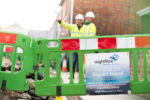With more people wearing face masks and coverings, whether that’s in shops, health centres or on public transport, it’s important to remember it can cause problems for those with hearing loss or those with autism.
Making it harder to communicate
Research by Audiologists at Specsavers reveal that a fifth of people (19%) with hearing loss have experienced an increase in frustration, embarrassment and isolation during lockdown, and that facemasks are making it even harder to communicate.
The survey also reveals that almost 60% of people who know someone with hearing loss have noticed greater levels of isolation in their friends and family than ever before.
Harrison: Face masks make lip-reading impossible and distorts sound
Gordon Harrison, Specsavers’ chief audiologist, says,
“It is not uncommon for people with hearing loss to find it difficult to communicate, especially in a loud and busy atmosphere. But as the wearing of face masks becomes the new normal, making lip-reading impossible and distorting sound, it can be even more challenging.
“A face mask acts as a barrier, particularly to the higher speech frequencies where the key information in words is contained, and to plosive sounds that are produced on the lips, such as ‘f’, ‘ch’ and ‘p’. These sounds don’t carry the same energy as those produced in the back of the mouth and throat, such as ‘ee’ and ‘oo’, and can impact on the ability to hear.
“To combat this, we’re issuing advice to make it easier to communicate when wearing facemasks. Our audiologists will do their utmost to ensure that no-one is struggling, and they can offer solutions and advice tailored to each person’s individual needs.”
People with autism
The wearing of face masks or coverings can also cause problems for people with autism, who even ion pre-Covid-19 times could sometimes find it difficult to understand facial expressions.
Support for those with autism during Covid-19 can be found on the National Autistic Society’s Website.
How to wear a face mask
Government guidance on wearing face masks or coverings can be found on their Website.
They say face coverings should not be used by children under the age of 3 or those who may find it difficult to manage them correctly. For example, primary age children unassisted, or those with respiratory conditions.
Image: Evgeni Tcherkasski under CC BY 2.0





